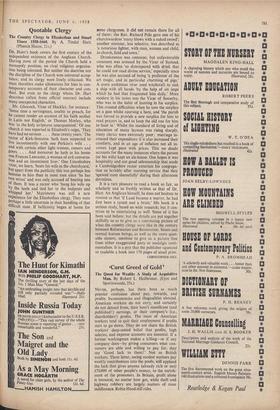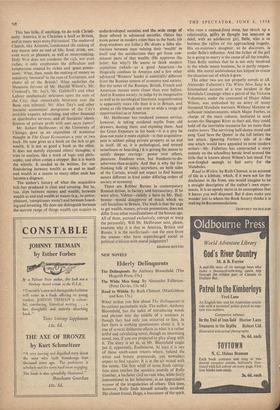'Curst Greed of Gold'
NEVER, perhaps, has there been as much popular confusion about pay, rewards, and profits. Inconsistencies and illogicalities abound. American workers do not envy, and certainly do not detract from, their boss's munificent (and published!) earnings, or their company's (i.e., shareholders') profits. The ' mass of American workers tend to quit their employment if profits start to go down. They do not share the British workers' deep-seated belief that profits, high salaries, and expense accounts are immoral. If a former workingman makes a killing—or if any company does—by giving consumers what con- sumers are able and willing to pay for, they say 'Good luck to them!' Not so British workers. These latter, seeing modest workers pay weekly contributions into the pools, will applaud the luck that gives anyone (already rich or not) £70,000 of other people's money, to the enrich- ment of the promoters. In Britain, profit alone is immoral, no matter how got, while theft and highway robbery are largely matters of mass indifference. Robin Hood still rules.
This has little, if anything, to do with Christi- anity. America is as Christian a land as Britain, and in many ways more Puritanical. The mediaeval Church, like Aristotle; 'Condemned the making of any means into an end of life; food, drink, sex, even work or pleasure, as well as moneymaking. Holy Writ does not condemn the rich, nor even riches; it only emphasises the difficulties and temptations created by riches and 'great posses- sions.' What, then, made the making of money so massively 'immoral' in the eyes of Europeans, and above all of the British? What underlies the Messianic fervour of Mr. Harold Wilson's, Mr. Crosland's, Mr. Jay's, Mr. Gaitskell's and other Labour intellectuals' strictures upon the men of the City; their remarkable bitterness over the Bank rate tribunal; Mr. Alan Day's and ,other Socialist economists' denigration of the City's invisible exports, advertising, and other financial or distributive services; and all Socialists' identi- fication of private profit with auri sacra fames?
Mr. Robert Heilbroner, of the University of Chicago, gave us an exposition of economic thought in The Great Economists a year or two back. He now gives us a book on the itch to get wealth. It is not as good a book as the other. It does not merely expound others' thoughts; it tries to analyse, like a work of logic and philo- sophy, and often comes a cropper. But it is worth the whistle. It needed to be written, for our floundering between wealth as an end in itself and wealth as a means to many other ends has become a disgrace.
The author's history of what the acquisitive itch has produced is clear and amusing. But he, too, slips between money and wealth, between wealth as end and wealth as means (e.g., to power, pleasure, 'conspicuous waste') and between hoard- ing and investing. He does not distinguish between the narrow range of things wealth can acquire in underdeveloped societies and the wide range of them offered in advanced societies. (Satan has more power in modern cities than in the hush; his shop-windows are fuller.) He draWs a false Ilis- tinction between men valuing their `wealth' in itself and the satisfactions they get from con- stituent parts of that wealth. (He approves the latter; but why?) He seems to think modern capitalism (which—as a good American—he illogically confines to America and a few other advanced Western' lands) is essentially' different from the Russian system of economy and society. But the tastes of the Russian, British, French and American masses seem closer than ever before. And in Russian society, to judge by its imaginative as well as its sociological literature, acquisitiveness is apparently more rife than it is in Britain, and about as rife (though not over so wide a range of opportunities) as in America.
Mr. Heilbroner has rendered yeoman service, however, in taking outdated myths from old drawers, dusting them, and exposing them. And the Great Exposure in his book—it is a pity he .does not make it more explicit—is that acquisitive- ness is seldom piling private property as an end in itself. (If so, it is pathological, and termed miserliness or hoarding.) It is getting the means to satisfy deeper cravings : power over others, pleasures, freedoms even, but freedoms-to-do- otherwise-than-acquire. And that is why the few thinking folk of today, 'anywhere, on both sides of the Curtain, would not expect to find human nature different in kind under differing orders of society or economy.
There are Robber Barons in contemporary Russian fiction, in factory and bureaucracy. If he were alive, Veblen--clearly, a hero to Mr. Heil- broner—would disapprove of much which we call Socialism in Britain. The truth is that the urge to get wealth, money, private possessions, does not differ from other manifestations of the human ego. All of them, pursued exclusively, corrupt or warp the personality. Will Mr. Heilbroner next, please, examine why it is that in America, Britain and Russia, it is the intellectuals—not the men from the masses—who have supercharged social or political criticism with moral judgments?
GRAHAM HUTTON











































 Previous page
Previous page